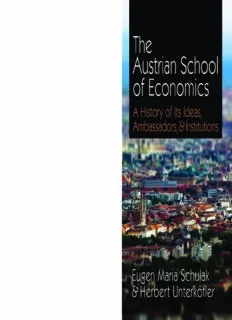
The Austrian School of Economics: A history of its ideas, ambassadors, and institutions PDF
Preview The Austrian School of Economics: A history of its ideas, ambassadors, and institutions
e Austrian School of Economics e Austrian School of Economics A History of Its Ideas, Ambassadors, and Institutions Eugen Maria Schulak and Herbert Unterköfler TranslatedbyArleneOost-Zinner Ludwig von Mie Intitute AUBURN,ALABAMA Copyright©2011bytheLudwigvonMisesInstitute PublishedundertheCreativeCommonsAttributionLicense3.0. http://creativecommons.org/licenses/by/3.0/ LudwigvonMisesInstitute 518WestMagnoliaAvenue Auburn,Alabama 36832 Ph: (334)844-2500 Fax: (334)844-2583 mises.org 10 9 8 7 6 5 4 3 2 1 ISBN:978-1-61016-134-3 Translator’s Note egoalofthistranslationisaccuratelytoconveythecontentofitsoriginal Germancounterpart,aswellasthebreezystyleofitsunmistakablyAustrian authors. Wordchoicewasofprimeconsiderationthroughout,followedby clearEnglishsyntaxandcontemporaryidiomaticusage. ebookcontains many citations from German works never before translated. All passages fallingintothiscategoryhavebeenrenderedinEnglishforthefirsttimein thisedition. etranslatorwishestothankDouglasFrenchandJeffreyTuckerofthe MisesInstituteforbringingthisimportantprojecttoherattention;Nathalie Charron Marcus for countless hours of tracking down details; and Robert Grözinger,whosepreliminarytranslationprovedhelpfulthroughout. Auburn,Alabama February, v Contents PrefacetotheEnglishEdition ix Preface xi eAustrianSchoolinBrief xv 1 ViennaintheMid-NineteenthCentury 2 EconomicsasanAcademicDiscipline 3 eDiscoveryoftheSelf: eeoryofSubjectiveValue 4 eEmergenceoftheAustrianSchoolintheMethodenstreit 5 CarlMenger: FounderoftheAustrianSchool 6 TimeisMoney: eAustrianeoryofCapitalandInterest 7 FriedrichvonWieser: FromEconomisttoSocialScientist 8 EugenvonBöhm-Bawerk: Economist,Minister,Aristocrat 9 EmilSax: eReclusefromVoloska 10 FurtherStudentsofMengerandOtherSupporters 11 MoneyMakestheWorldGoRound: eMonetaryeoryof theBusinessCycle vii viii CONTENTS 12 JosephA.Schumpeter: MaverickandEnigma 13 Schumpeter’seoryofEconomicDevelopment 14 eAustrianSchool’sCritiqueofMarxism 15 andtheConsequencesofWar: eImminentCollapse 16 BetweentheWars: FromRe-formationtoExodus 17 LudwigvonMises: eLogicianofFreedom 18 FriedrichAugustvonHayek: GrandSeigneurontheFence 19 OtherMembersoftheYoungerAustrianSchool 20 Praxeology: ANewStartfromLudwigvonMises 21 FriedrichAugustvonHayek’sModelofSocietyandHis eoryofCulturalEvolution 22 eEntrepreneur 23 eRejectedLegacy: AustriaandtheAustrianSchoolAfter 24 eRenaissanceoftheold‘Viennese’School: eNew AustrianSchoolofEconomics Abbreviations References Index Preface to the English Edition WhenpreparationsfortheGermaneditionwerecomplete,theprospect ofanEnglishtranslationlayinthefardistance. atitwouldcomeabout so quickly, only shortly after the German edition’s appearance in , is owedtoourfriendandmentor,Hans-HermannHoppe. Henotonlylent his support and good counsel in the case of the first German edition— now in its second edition—but also brought it to the attention of the LudwigvonMisesInstitute,suggestingitpublishatranslatededition. is development is without doubt a great joy for the authors. Along with it comes the expectation that the recast contents will reach a much wider audiencethaneverbefore. Whoever believes that the honor of having one’s work translated in- cludes the convenient self-contentment of looking on as others labor with the same text one had successfully concerned himself with years before, makes a formidable error. Rendering a comprehensive bibliography in an- other language in a user-friendly way is alone a task that can scarcely be brought to perfection. All in all, the pitfalls of translation are numerous, unexpected, and theoretically endless, especially in the scientific literature. isis evermorethecase when intellectual orpolitical schools of thought are to be conveyed across culture or language groups, preferably without losing meaning. e many discontinuities, violent upheavals, and con- tradictions in the history of middle Europe, wherein ideas, institutions, and terms were repeatedly in need of turning upside down and reframing, pose unusual problems. Take the question, for example, of whether cer- tain historical personalities should be cited according to their legal names or according to the inherited, aristocratic titles they carried with them to foreign lands. Further, one stumbles upon the limits of language when ix
Description: